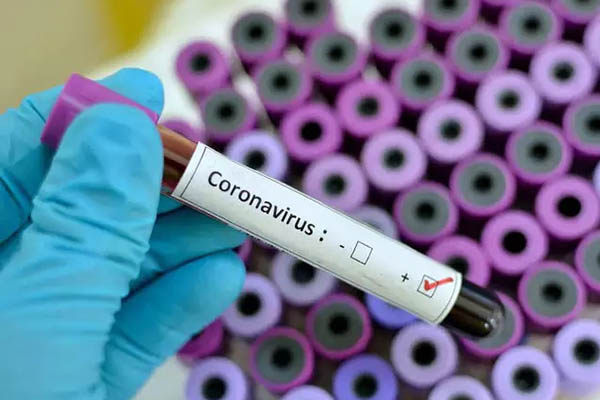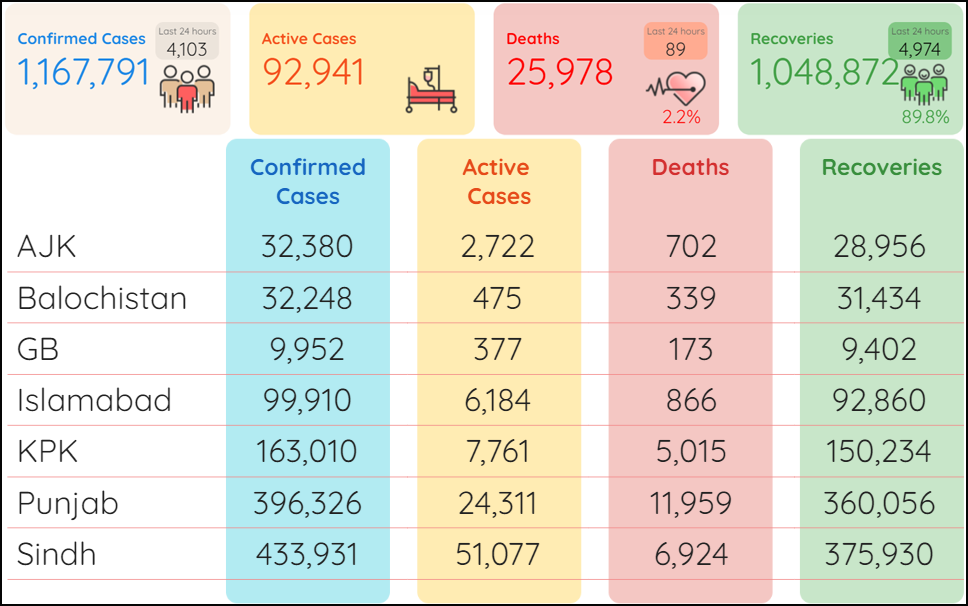
File photo
Confirmed infections of COVID-19 reach 1,167,791, against 1,048,872 recoveries and 25,978 deaths, leaving 92,941 active cases
Pakistan on Thursday reported 4,103 new infections of COVID-19 after conducting 61,651 tests—a positivity ratio of 6.6 percent.
The National Command and Operating Center on Wednesday announced that the Pfizer vaccine will be administered to citizens below 18, as it commenced inoculations of 17 year olds. It said that people under-18 who did not possess a CNIC would need to provide their B-form number for registration in the National Immunization Management System. In a statement, the forum added that immunocompromised individuals between 12 and 17 years old could now also get vaccinated, however they would need to show proof of their ailments before they could be inoculated.
Confirmed Cases, Total – 1,167,791 (Tests: 17,871,620)
Punjab – 396,326
Sindh – 433,931
Balochistan – 32,282
Khyber-Pakhtunkhwa – 163,010
Islamabad – 99,910
Gilgit-Baltistan – 9,952
Pakistan-administered Kashmir – 32,380
Deaths – 25,978
Recoveries – 1,048,872
In the 24 hours preceding 8 a.m., Thursday, Pakistan’s confirmed cases climbed to 1,167,791. Meanwhile, deaths increased by 89 to 25,978. At the same time, recoveries increased by 4,874 to 1,048,872, or 89.8 percent of total infections. There are currently 92,941 active cases of COVID-19 in the country, with the NCOC saying 4,717 of them require critical care.

Punjab
On Thursday, authorities reported 44 deaths due to the coronavirus, raising total casualties to 11,959. The province now has 396,326 confirmed cases; it reported 1,588 new infections after conducting 23,394 tests, a positivity ratio of 6.8 percent. There were 2,935 new recoveries recorded, leaving 360,056 fully recovered, and 24,311 active cases of the virus.
Sindh
Confirmed cases of the novel coronavirus in Sindh have now climbed to 433,931; it reported 1,294 new infections on Thursday after administering 17,362 tests, a positivity ratio of 7.4 percent. The province reported 14 deaths, raising toll to 6,924, while its recoveries rose by 918 to 375,930. Overall, the province now has 51,077 active cases of the novel coronavirus.
Khyber-Pakhtunkhwa
The provincial government on Thursday reported 608 new cases after conducting 12,147 tests, a positivity ratio of 5 percent. Overall, Khyber-Pakhtunkhwa’s confirmed cases have climbed to 163,010. It recorded 27 new deaths and 564 recoveries, raising toll to 5,015 and recoveries to 150,234. There are currently 7,761 active cases of COVID-19 in the province.
Balochistan
The province on Thursday raised its confirmed cases to 32,282 with 34 new infections after conducting 1,341 tests, a positivity ratio of 2.5 percent. There were no deaths and 6 recoveries reported in the past 24 hours, leaving 339 fatalities and 31,434 fully recovered. There are now 475 active cases of COVID-19 in the province.
Federal Areas
Islamabad on Thursday raised its confirmed coronavirus cases by 394 to 99,910 after conducting 5,611 tests, a positivity ratio of 7 percent. There were no deaths and 255 recoveries recorded in the past 24 hours, leaving 866 casualties; 92,860 recovered; and 6,184 active cases.
Gilgit-Baltistan on Thursday reported 33 new cases after administering 732 tests, a positivity ratio of 4.5 percent. It currently has 9,952 confirmed cases. There were no deaths and 12 recoveries reported in the past 24 hours, leaving 173 fatalities; 9,402 fully recovered people; and 377 active cases of COVID-19.
In Pakistan-administered Kashmir, confirmed cases rose by 152 to 32,380 after administering 1,064 tests, a positivity ratio of 14.3 percent. There were 4 deaths and 284 recoveries in the past 24 hours, leaving 702 fatalities and 28,956 fully recovered. It now has 2,722 active cases of COVID-19.
Across the world
Globally, the virus has now infected more than 219,282,805 people, with over 4,545,444 reported deaths. After having passed through multiple waves of the pandemic, the world is divided between countries that are either in the midst of new waves driven by mutated variants, or have launched mass vaccination drives that are allowing them to reopen safely. There are mounting calls, including from the World Health Organization, for “vaccine equality,” i.e. for developed nations to stop hoarding vaccines in excess of their requirements and to share them with the developing world to help curb the spread of new mutated variants, especially the Delta variant that is now driving the bulk of confirmed infections globally. Overall, around 196,074,195 patients of the 219.3 million+ infected have recovered thus far.
